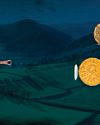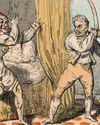
1 Slithering into infamy
Forget wings and legs, the earliest western dragons resembled massive snakes
Every small child of the modern west can describe a dragon: it is a broadly serpentine creature (colour of choice: green); it has an animalian head; between its longish neck and longish tail it has a fattish body; it has four legs; it has a pair of wings; it can be somewhat spiky.
Adults might add a further observation: that the dragon of this shape is a thing of beauty. The internet is awash with contemporary fantasy-images of the creatures, lovingly tricked out in elaborate detail.
And this points up a paradox: although the function of dragons is to be creatures of ultimate terror, we just love them. Who cares about St George and his damsel in distress? It's the dragon that makes the legend. And are the dragons not the cherries in the cakes baked by Tolkien, JK Rowling and George RR Martin? But the universality of this dragonshape across the west should not blind us to the fact that it is artificial, a random collection of body parts drawn from different creatures of the natural world.
So where does this amalgamation come from? How did the dragon so familiar to modern fans of fantasy fiction come to be?
To answer this question we must first return to classical Greece. The word "dragon" derives, via medieval French, from the Latin draco, which is itself a borrowing of the ancient Greek term drakön_
Esta historia es de la edición September 2022 de BBC History UK.
Comience su prueba gratuita de Magzter GOLD de 7 días para acceder a miles de historias premium seleccionadas y a más de 9,000 revistas y periódicos.
Ya eres suscriptor ? Conectar
Esta historia es de la edición September 2022 de BBC History UK.
Comience su prueba gratuita de Magzter GOLD de 7 días para acceder a miles de historias premium seleccionadas y a más de 9,000 revistas y periódicos.
Ya eres suscriptor? Conectar

The Victorians' cocaine habit
In the 19th century, a magic new drug took the medical community by storm, riding a wave of scientific endeavour.

Tower of light and dark
The gold-tipped monument that towers above Bath is an architectural jewel and a visceral reminder of the evils of slavery. PAUL BLOOMFIELD visits the newly restored haven built by the wealthy outcast William Beckford

How Britain found its frequency
When radios first appeared in British homes in the early 20th century, one thing soon became clear: domestic life would never be the same again. Beaty Rubens tracks Britons' reaction to this extraordinary new technology via seven cartoons

There are only a handful of survivors left who can say what happened
I WAS INTERVIEWING AN ALMOST 98-YEAR-OLD man about his memories of the Second World War this week.

THE KING LOST KINGDOM
Battered by the Vikings, outshone by King Alfred, Mercia has long been painted as the also-ran of the Anglo-Saxon world. Yet, writes Max Adams, this mighty Midlands kingdom was at the very heart of the emergence of England

Donald Trump has retaken the US presidency, repeating his vow to 'Make America Great Again'. But he's not the first to wield such a slogan. Back in the 1980s, Ronald Reagan stood for election with the same promise.Did he deliver?
Donald Trump's recurring battle cry \"Make America Great Again!\"- taps into a powerful sense among many Americans that life was better in the old days.

"In times of political volatility, it's more vital than ever that we tell women's stories"
What impact has recent instability around the world had on the study of women’s history? Does our desire for strong female role models risk erasing complexity? And whose lives are still overlooked? Ahead of Women’s History Month, ELLIE CAWTHORNE spoke to three historians about the state of the discipline

Five shocking tales from Britain's royal palaces
Royal residences have been a hotbed of drama, violence and intrigue down the centuries, as Kate Williams reveals

Why, the villagers wondered, were they completely green?
The story of the otherworldly children of Woolpit has long been treated as folklore - but, as John Clark explains, the tale may not be as fanciful as it seems

We are witnessing the biggest gathering of people in world history
I'M SURE, LIKE ME, READERS HAVE BEEN BOTH gripped and saddened this last month by the pictures of India's Kumbh Mela, the biggest pilgrimage in the world.
